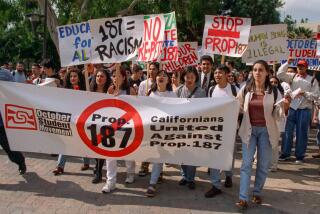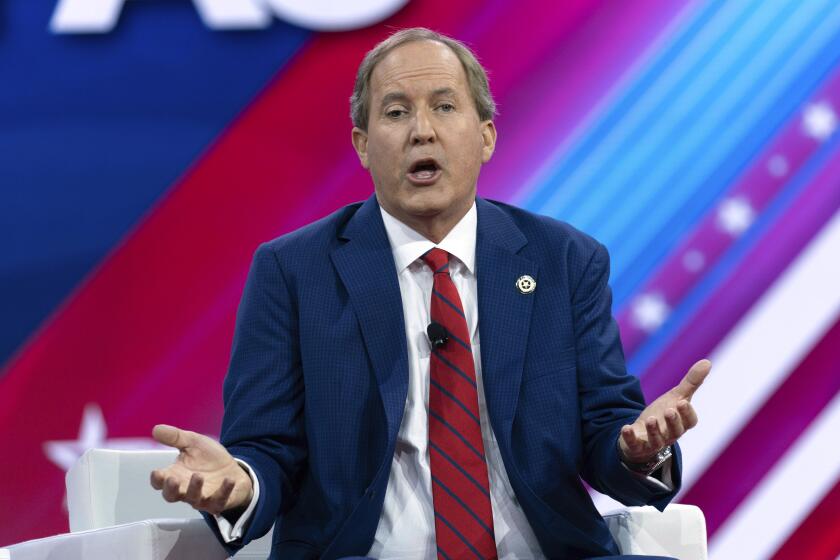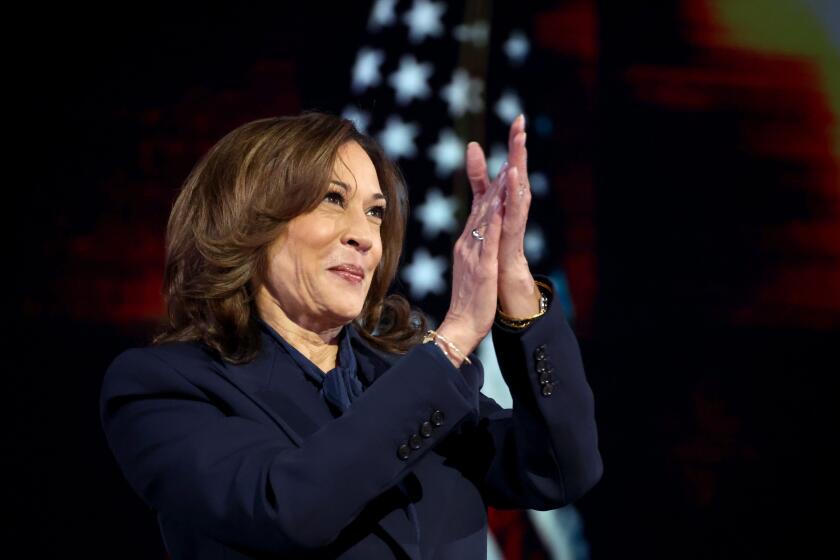Prop. 187 Ruling Frustrating for Voters : Reaction: Wide support does not mean initiatives will hold up in court.
Greg Ludlum is hopping mad. A year ago, he trudged to the polls and cast a vote for Proposition 187. He did it with passion, believing that his ballot would help keep illegal immigrants from collecting benefits he insists they do not deserve.
The measure passed overwhelmingly. And Ludlum, like many other Californians, was elated.
But on Monday a federal judge had her say. Despite voters’ unbridled ardor for Proposition 187, major portions of the measure are legally invalid, she ruled in the first review of the measure’s constitutionality.
High-ranking backers of the initiative, including Gov. Pete Wilson, could hardly claim surprise. Voter initiatives typically receive no rigorous legal analysis before being allowed on the ballot, and even when supporters were rallying support for Proposition 187, they conceded that it might not hold up in court.
But to many everyday voters, this week’s news could come as a crushing blow. For Ludlum and others, the defeat--even if only temporary--amounts to further proof that participation in the political process is a big waste of time. If the measures they care about pass at the polls but are tossed out in court, then what’s the point, they wonder. Why bother voting at all?
“It’s disillusioning,” said Ludlum, a sign manufacturer in the Sierra foothill town of Nevada City. “The vote that I cast now seems pointless.”
As for U.S. District Judge Mariana R. Pfaelzer, who authored Monday’s ruling, Ludlum had this message: “I think they ought to put her in charge of traffic tickets,” he fumed. “The voice of the people should rule, not be struck down by one person’s opinion.”
In her 72-page ruling, Pfaelzer seemed to anticipate the voters’ emotions. She noted that Californians had approved Proposition 187 by an “overwhelming” margin and empathized with voters’ “justifiable frustration” with the immigration problem. She said such concerns, however, do not change the legal realities of the case.
Experts say voters’ angst over Proposition 187’s fate is not unexpected.
Most California voter initiatives--from the landmark, tax-cutting Proposition 13 in 1978 to last year’s “three strikes” anti-crime measure and the 1972 coastal protection act--survive legal challenges. Typically, courts appear to have bent over backward to uphold measures passed at the polls, scholars say.
Of the 36 initiatives enacted by the state’s voters since 1964, only six have been totally or substantially invalidated by court rulings and eight have been partially overturned in court, according to an analysis by campaign finance activist Bob Stern.
Other initiatives that judges have invalidated after voters approved them include measures that would have repealed open housing laws, banned pay television, banned school busing for integration, repealed the inheritance tax, provided public financing of campaigns and mandated various consumer disclosures.
In the case of Proposition 187, Pfaelzer ruled that the federal government has exclusive authority to regulate immigration. State efforts to deny illegal immigrants health care and social welfare services are unlawful, she said. And depriving them of elementary and secondary school education contradicts a 1982 decision by the U.S. Supreme Court.
Gary Jacobson, a political scientist at UC San Diego, said voter frustration with the judge’s finding is natural: “When you vote for something and it doesn’t happen because the courts stop it, that’s not fun.”
On the other hand, Jacobson added, voters should realize that making law by initiative has its risks:
“When the voters put themselves in a position to make policy, they will run into the same kind of barriers that legislators do,” he said. “When the Constitution is not on your side, you lose.”
Barbara O’Connor, a professor at the Institute for the Study of Politics and the Media at Cal State Sacramento, said decisions like Pfaelzer’s leave voters feeling adrift. People believe they are taking action against a problem by voting and then come up empty-handed when the courts overturn their action.
Such frustration is evident on the streets, said Ruth Holton of California Common Cause, which is gathering signatures to qualify a campaign finance reform measure for the November, 1996, ballot.
“When I’m out asking for signatures, I get a lot of people saying, ‘Well, is this really going to take effect?’ or ‘Why should I bother,’ ” Holton said. “There’s a lot of disillusionment out there.”
Susan Whaley, a schoolteacher in Sacramento, confirms that assessment. A majority of Californians voted for Proposition 187, and then “someone says, ‘Forget it,’ ” Whaley lamented.
“It is a big waste to go through all the arguments, all the upheaval, and then when we finally vote on it, we cannot implement it. It doesn’t make sense to me . . . Maybe the system needs to be changed.”
In their frustration over decisions like the one made by Pfaelzer, experts say, voters tend to blame the most obvious players--the individual judge or court, or the overall “system.” O’Connor, however, faults the drafters of initiatives--and the politicians who use such measures to propel themselves into office.
“The blame is laid rightly with the authors of propositions, who know that they intrinsically are going to be challenged,” she said.
Alan Nelson, the former INS commissioner who co-authored Proposition 187, acknowledged that he and others knew their measure conflicted with the U.S. Supreme Court case and was thus on shaky legal ground. But he dismissed arguments that he bears blame for voter malaise.
“A lot of these people are living in never-never land and have no realistic knowledge of what is going on in the world,” Nelson said of his academic critics, whom he faulted for failing to come up with alternate solutions to the immigration problem.
“Why have initiatives if the court is going to strike them down? Because it’s one of the elements of government that people can use,” he said. “It can be overused or underused. I think 187 is an example of the proper use.”
Politicians who relied on Proposition 187 in their 1994 campaigns said that despite the court setback, passage of the measure has had positive effects.
Paul Kranhold, a spokesman for Wilson, said that “the message of Proposition 187 was heard by the Congress loud and clear.” As a result, the federal government is now taking seriously the state’s demand that it be reimbursed for services it provides illegal immigrants, he said.
In a statement, Wilson said he strongly disagreed with Pfaelzer’s ruling but believed that, “in the end, Proposition 187 will be the law.”
Some political scientists suggest that the fate of Proposition 187--and the frustration it has spawned--proves there should be some screening of ballot initiatives to warn voters about which are likely to be overturned.
“It strikes me as a way to save money, and also as inherently intellectually honest,” said O’Connor, the Sacramento State political scientist.
Under current rules, a proposed initiative is subjected to no legal or judicial review before it appears on the ballot. A proponent merely submits an idea to the state attorney general, pays $200 for processing costs and collects the signatures necessary to qualify an initiative for the ballot. The attorney general gives the measure an official title and writes a brief summary of its purpose, while government analysts examine its potential effects on state and local finances.
In the meantime, drafters of measures for future ballots are taking note of the constitutional defects in Proposition 187 and are wording their propositions with great care.
California Common Cause, which is pushing the campaign financing initiative, has been “very careful to include only provisions that have been tested in other courts,” said Holton, the group’s executive director.
“We don’t want to go through this same nonsense,” she said. “However, I’m sure we can fully expect the opponents to go after us in court. They always do.”
Authors of the proposed “California civil rights initiative” that would abolish government affirmative action programs for women and minorities are being equally cautious. The initiative includes language saying that if any part of the measure violates federal law, then that portion shall not be enforced. Drafters hope that device will protect the bulk of the proposition from legal challenge.
Two 1988 measures to reform campaign financing passed at the polls but were never fully implemented.
That same year, the state Supreme Court curbed the reach of Proposition 51, the “deep-pockets” liability reform initiative, by ruling that it did not apply to cases pending when it was passed by voters.
One of the few initiatives to be tossed out wholesale was 1988’s Proposition 105, the so-called truth-in-advertising law.
The California Supreme Court ruled in 1991 that Proposition 105 was not restricted to a single subject, as is required. The initiative would have required nursing homes to disclose health and safety violations, businesses to warn against toxic products, initiative commercials to list their major sponsors, and corporations to reveal whether they did business in South Africa.
And then there was Proposition 103, which sought to roll back auto insurance rates. Passed in 1988, it was tied up in the courts for years.
Ultimately, it was largely upheld by the California Supreme Court, and the U.S. Supreme Court refused to review the case. Now, seven years after its passage, most insurance companies have gone along with orders to rebate, and an estimated $1 billion has been disbursed.
Warren reported from Sacramento and Decker from Los Angeles. Staff writer Carl Ingram contributed to this report.
More to Read
Sign up for Essential California
The most important California stories and recommendations in your inbox every morning.
You may occasionally receive promotional content from the Los Angeles Times.







